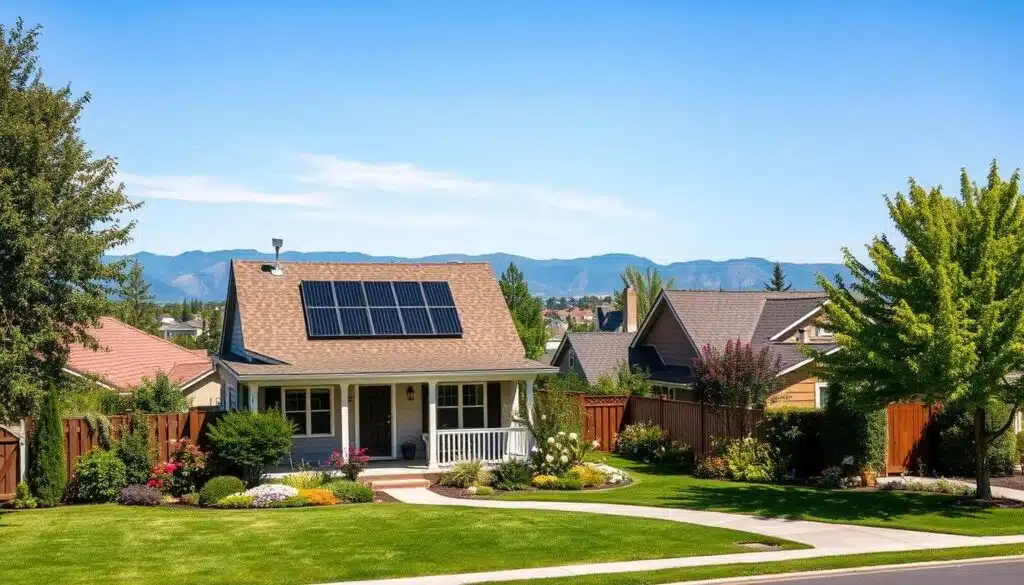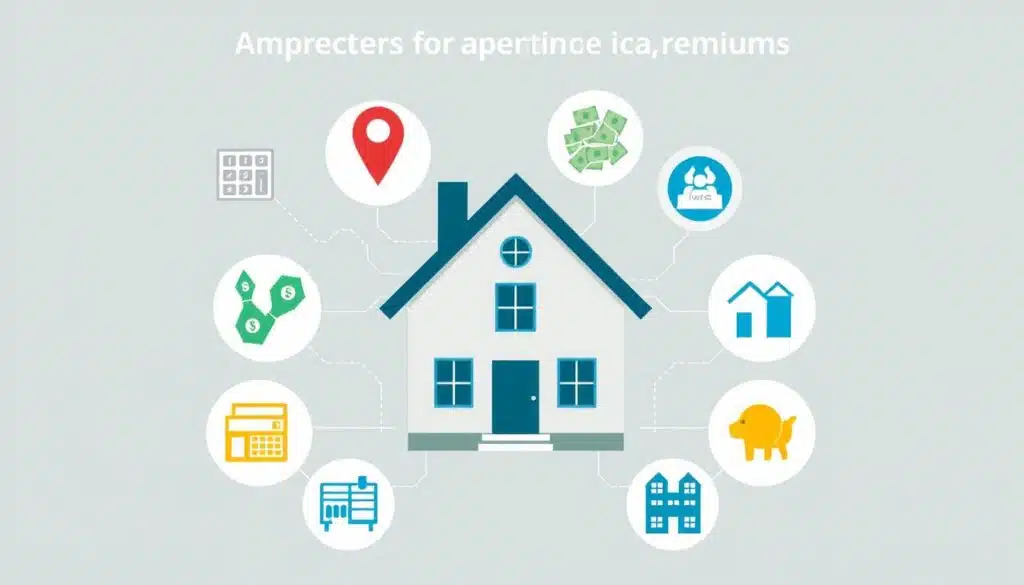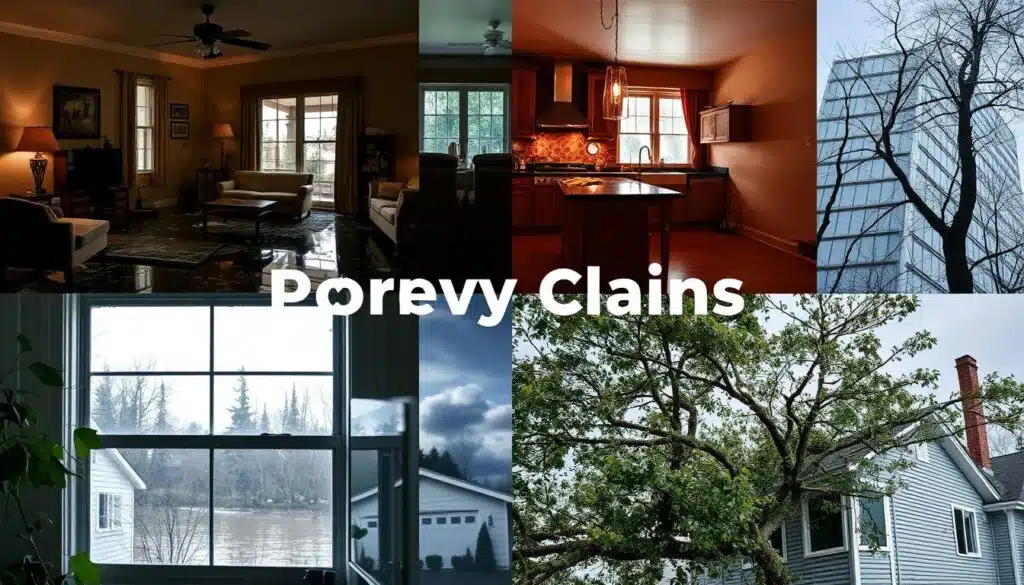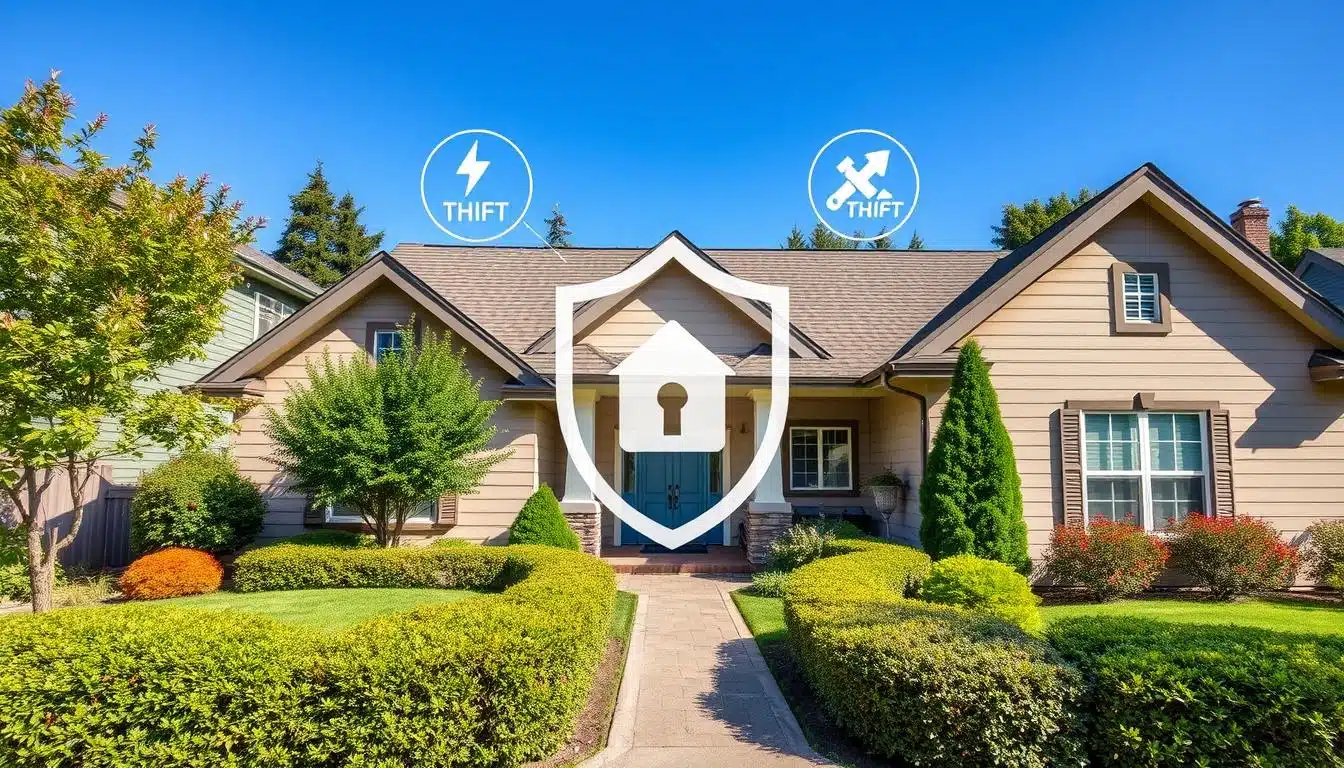Property insurance covers many types of policies that protect property owners. It includes homeowners, renters, flood, and earthquake insurance. This insurance helps pay for damage, theft, or injuries on your property.
It usually covers the building and your belongings. But, it might not cover very expensive items. You might need extra coverage for those.
Key Takeaways
- Property insurance provides financial protection for homeowners, renters, and commercial property owners.
- Coverage can include replacement cost, actual cash value, and extended replacement costs for damaged or stolen property.
- Policies often exclude certain perils like floods, earthquakes, and acts of war, which may require separate coverage.
- Factors like location, home value, and claims history can impact property insurance premiums and deductibles.
- Understanding the different types of property insurance policies and their coverage details is crucial for adequate protection.
Understanding Property Insurance Basics
Property insurance, also known as homeowners insurance, is key to protecting your home and belongings. It covers many risks like fire, theft, and damage from natural disasters. It also helps if someone gets hurt on your property. Most lenders need you to have this insurance to protect their investment.
What Is Property Insurance and Why It Matters
Property insurance is vital for your home and property. It helps you avoid big financial losses from unexpected events. With homeowners insurance quotes and home insurance quote options, you can find the right coverage for your home and property.
Key Components of Property Insurance Coverage
Homeowners insurance policies have three main types of coverage:
- Replacement cost – Pays to rebuild or repair your home to its pre-loss condition.
- Actual cash value – Pays the depreciated value of your damaged or stolen property.
- Extended replacement costs – Provides additional coverage beyond the policy limit to rebuild your home.
Types of Property Insurance Policies
The most common homeowners insurance policies are:
- HO1 (basic) – Covers the structure of your home and limited personal property against 10 named perils.
- HO2 (broad form) – Provides broader coverage, protecting against 16 named perils.
- HO3 (special form) – Offers the most comprehensive coverage, protecting your home and possessions against all perils except those specifically excluded.
- HO4 (renters) – Covers a renter’s personal property and liability.
- HO5 (comprehensive) – Provides the highest level of coverage, protecting your home and belongings against all risks except those specifically excluded.
- HO6 (condominium) – Covers the interior of a condominium unit and personal property.
Knowing the different property insurance types and what they cover is key. It helps ensure you have the right protection for your home and property.
Different Types of Coverage Options

Homeowners insurance policies come with many coverage options. These options help protect your home and assets. Knowing what’s available can help you find the right policy for your needs.
Standard policies usually cover six main areas:
- Dwelling Coverage: This protects your home and any attached structures, like garages or porches.
- Other Structures Coverage: It covers detached structures, such as sheds or fences.
- Personal Property Coverage: This protects your belongings, including furniture, appliances, and clothes.
- Loss of Use Coverage: It helps with temporary living costs if your home is not livable due to damage.
- Personal Liability Coverage: It offers financial help if someone gets hurt on your property or you damage their property.
- Medical Payments Coverage: It covers minor injuries to visitors, no matter who’s at fault.
Homeowners might also want flood insurance to protect against water damage from floods. Getting a homeowners insurance quote can help you explore these options and find a policy that fits your budget.
| Policy Type | Coverage Highlights | Typical Uses |
|---|---|---|
| HO-3 (Special Form) | Covers all risks of physical loss except for specifically excluded perils | The most widely used homeowners policy |
| HO-5 (Comprehensive Form) | Provides coverage for all risks of physical loss for both the home and personal possessions | Offers broader personal belongings coverage compared to HO-3 |
| HO-6 (Condominium Policy) | Covers contents and property within the unit, while the condominium buildings and common areas are usually insured through policies issued to the condominium owners’ association | Specific for condo owners |
Finding the right homeowners insurance policy is crucial. It offers financial protection and peace of mind. By understanding the different options, you can choose a policy that protects your home and assets well.
Property Insurance Costs and Premium Factors

It’s important for homeowners to know what affects their property insurance costs. Rates change based on many things, like where the home is, how old it is, and how much coverage you want. Claims history also plays a big role.
Factors Affecting Insurance Rates
Several things can change your home insurance rates. The home’s location, age, and type of construction matter a lot. Homes in risky areas or older ones usually cost more to insure.
Being close to fire stations and the home’s replacement cost also matter. The amount of personal property coverage, liability coverage, and your deductible choice affect your premium. A history of claims can also raise your rates.
Ways to Lower Your Premium
There are ways to lower your home insurance costs. You can raise your deductible, bundle policies, or add security systems. Good credit and avoiding small claims can also help.
Understanding Deductibles and Limits
Deductibles are what you pay first when you file a claim. Higher deductibles mean lower premiums but more out-of-pocket costs for you.
Policy limits show the max the insurance will pay for a loss. It’s key to think about what you need covered. Make sure your personal property and liability coverage are enough for your rental property or home.
“Understanding the factors that influence property insurance premiums is crucial for homeowners to make informed decisions and find the right coverage to protect their home.”
Common Property Insurance Claims and Coverage

Property insurance helps protect homeowners, renters, and landlords from many risks. Knowing about common claims and coverage can guide you when getting a free homeowners insurance coverage or rental property insurance policy.
Damage from wind and hail is a big issue, making up over 40% of claims. Most policies cover this damage, but the level of coverage can differ. Water damage from leaks or burst pipes is also common, making up about 28% of claims.
Theft and liability claims are common too, with theft claims averaging around $5,000. Fire and lightning damage, though less common, can be very costly, with claims over $80,000 on average.
| Claim Type | Percentage of Claims | Average Claim Cost |
|---|---|---|
| Wind and Hail | 40.7% | – |
| Water Damage and Freezing | 27.6% | $13,945 |
| Liability Claims | 1.6% | $31,690 |
| Theft | 0.7% | $5,024 |
| Fire and Lightning | – | $83,991 |
Many of these events are covered by homeowners insurance coverage. But, there might be exclusions or the need for extra coverage, like for sewer backup or valuable items protection. Checking your policy details is key to ensure you have the right landlord insurance or dwelling coverage for your property and assets.
By knowing about common claims and insurance coverage, you can make smart choices. This way, you can get a free quote and protect your property well.
Benefits and Protections of Property Insurance
Property insurance gives homeowners financial security and peace of mind. It’s key to protecting your home, your most valuable asset. By learning more about homeowners insurance, you can see how it safeguards your home.
Financial Protection Against Disasters
Property insurance helps protect your home and belongings from fires, storms, theft, and more. If a covered event happens, your policy covers the repair or rebuilding costs. This ensures your property is restored to its original state.
Liability Coverage Benefits
Property insurance also includes liability coverage. This helps protect you if someone gets hurt on your property and sues. The liability coverage can pay for legal fees and damages, saving you from financial loss.
Additional Living Expenses Coverage
If a disaster makes your home uninhabitable, your policy covers extra living expenses. This means you can keep your lifestyle while your home is fixed or rebuilt. It pays for temporary housing, meals, and other needs. This insurance that fits your needs is a vital safety net after a disaster.
Also Read : Event Insurance Guide: What It Covers And Why You Need It
FAQs
Q: What is homeowners insurance?
A: Homeowners insurance is a type of property insurance that provides financial protection against damage to your home and personal belongings, as well as liability coverage for injuries that occur on your property.
Q: How can I get a home insurance quote?
A: You can get a home insurance quote by contacting insurance companies directly, using online quote tools, or reaching out to an insurance agency that specializes in property and casualty insurance.
Q: What does a standard homeowners insurance policy cover?
A: A standard homeowners insurance policy typically covers dwelling coverage for the structure of your home, personal property coverage for your belongings, liability coverage for injuries to others, and additional living expenses if you cannot live in your home due to damage.
Q: Are there insurance discounts available for homeowners insurance?
A: Yes, many insurance companies offer homeowners insurance discounts for various reasons, such as having a security system, bundling policies (like auto and home insurance), or being claims-free for a certain period.
Q: Can renters insurance be beneficial for me if I don’t own a home?
A: Yes, renters insurance is beneficial as it protects your personal property in a rental property and provides liability coverage for injuries that occur to others while on your rented premises.
Q: What is flood insurance, and do I need it?
A: Flood insurance is a specific type of insurance that covers damage to your home and belongings caused by flooding. If you live in a flood-prone area, a flood insurance policy may be necessary, as standard homeowners insurance typically does not cover flood damage.
Q: What should I do if someone is injured on my property?
A: If someone is injured on your property, you should ensure they receive medical attention and report the incident to your homeowners insurance company. Liability coverage in your homeowners insurance policy may help cover their medical expenses or property damage claims.
Q: How can I protect my home and personal belongings?
A: You can protect your home and personal belongings by obtaining a comprehensive homeowners insurance policy, implementing security measures like alarms, and maintaining your property to prevent damage.
Q: What is dwelling coverage in a homeowners insurance policy?
A: Dwelling coverage is the part of a homeowners insurance policy that covers the physical structure of your home, including the walls, roof, and built-in appliances, against risks like fire, theft, and certain types of damage.
Q: How do I get a free quote for homeowners insurance?
A: To get a free homeowners insurance quote, you can visit insurance company websites, use online comparison tools, or contact insurance agents who can provide you with quotes based on your specific needs and coverage preferences.





